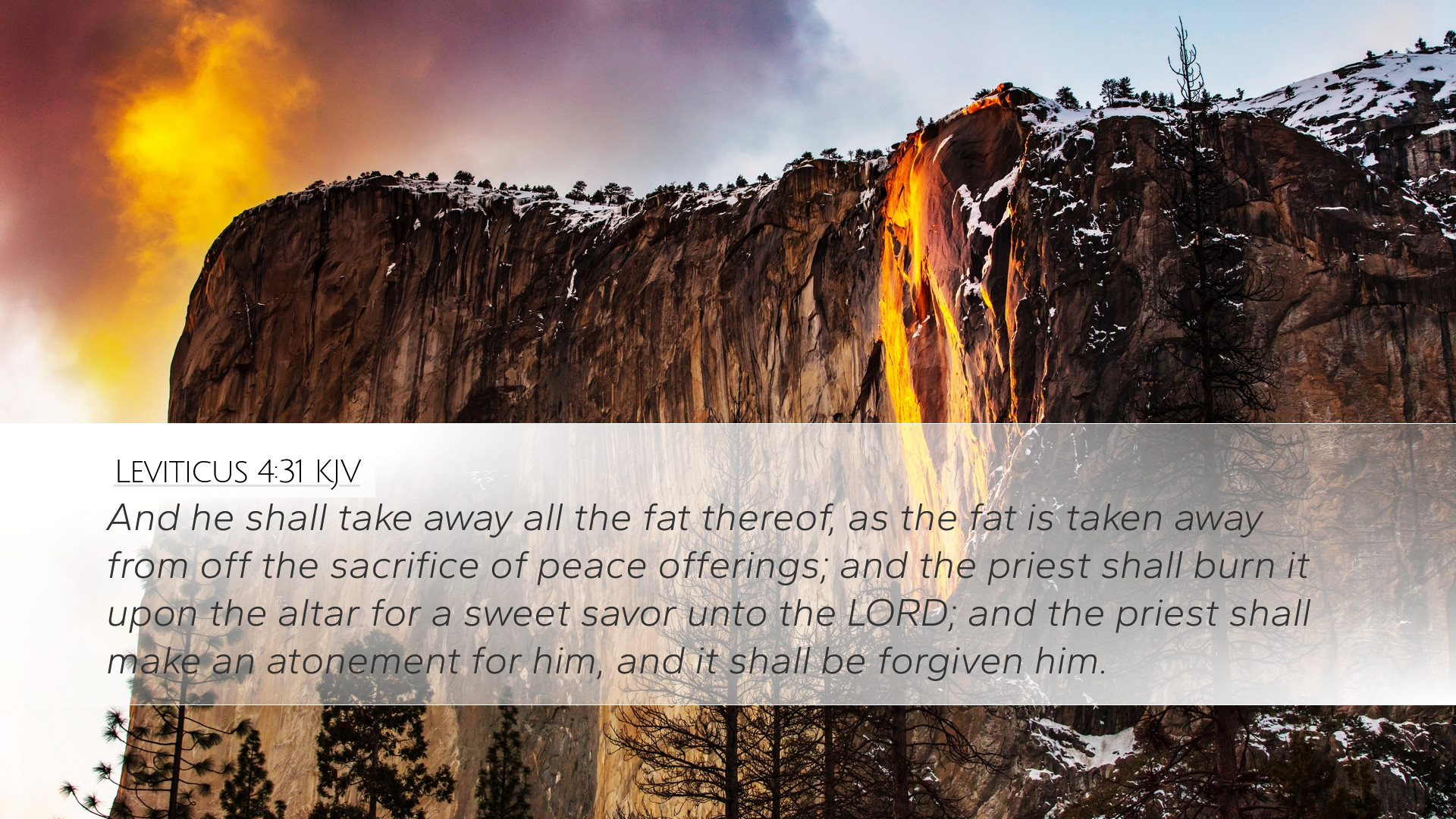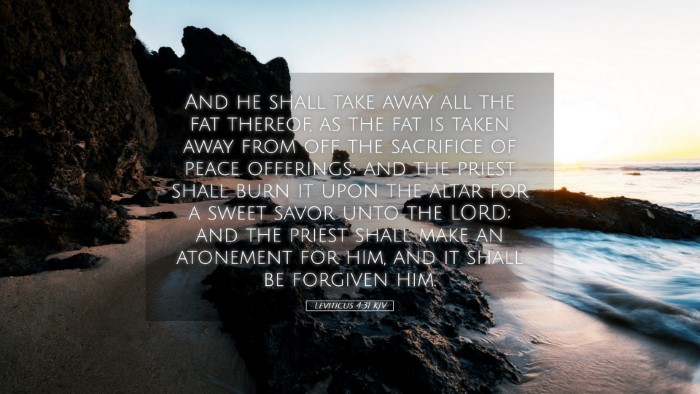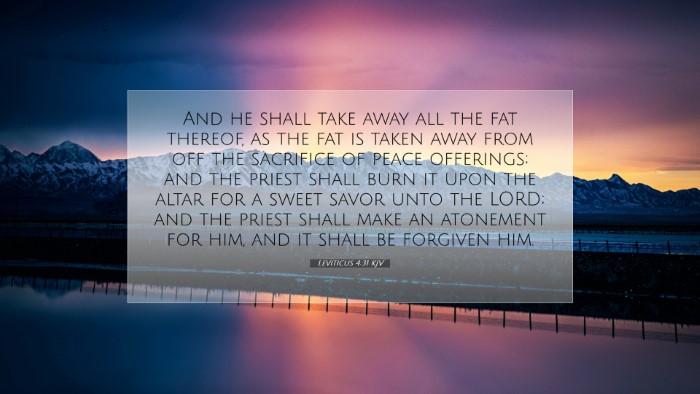Commentary on Leviticus 4:31
Bible Verse: "And he shall take away all the fat thereof, as the fat is taken away from off the sacrifice of peace offerings: and the priest shall burn it upon the altar for a sweet savour unto the LORD; and the priest shall make an atonement for him, and it shall be forgiven him." (Leviticus 4:31, KJV)
Introductory Overview
The passage in Leviticus 4:31 deals with the important topic of sin offerings within the framework of the Mosaic Law. It outlines the meticulous process through which a sinner can seek forgiveness and highlights the symbolic significance of fat in sacrificial offerings. This commentary combines insights from various public domain sources to enhance understanding for pastors, students, and theologians.
Contextual Setting
The Book of Leviticus primarily addresses the aspects of holiness and worship within Israelite community life. It provides instructions regarding the sacrificial system, where different offerings are prescribed to maintain a relationship between God and His people. Chapter 4 specifically tackles inadvertent sins committed by individuals and how they can atone for them through designated sacrifices.
Meaning of the Fat in Sacrifices
Understanding the significance of fat in the sacrificial system is crucial. The fat is considered the best part of the animal, symbolizing richness and abundance, thus representing the fullness of life in service to God. As Matthew Henry notes, the removal of fat signifies that which is most prized should be offered to God as an act of reverence and acknowledgment of His holiness.
Matthew Henry's Insight
Matthew Henry emphasizes that the dismissal of fat represents the necessity of separating what is profane from what is sacred. He explains that the act of burning fat on the altar serves as a "sweet savour unto the Lord," indicating God's pleasure in receiving the sacrifice. Thus, every sin can be graciously transmitted to God through oblations, demonstrating His mercy and the transformative power of atonement.
Albert Barnes' Commentary
Albert Barnes adds that the mention of the peace offerings highlights the broader context of joyous communion between God and His people. The fat, representing both physical vitality and spiritual devotion, is critical in conveying the seriousness of sin and the corresponding need for atonement.
The Role of the Priest
The officiating priest plays a pivotal role in the sacrificial ceremony outlined in Leviticus 4:31. Once the fat has been removed and burned, the text indicates that the priest shall make atonement for the individual, assuring them of forgiveness. Adam Clarke expounds on the priest’s duty as a bridge between the Holy God and sinful humanity. Without the priest's mediation, individuals would struggle to find reconciliation.
Theological Implications
This verse possesses deep theological implications related to the concept of atonement. In biblical theology, the sacrificial system reflected an early articulation of the need for substitutionary atonement, leading to the ultimate sacrifice of Christ, as further discussed in the New Testament. Clarke draws parallels between the Old Testament ritual and the New Testament doctrine of atonement through Christ’s blood.
Atonement and Forgiveness
The promise of forgiveness encapsulated within verse 31 surpasses mere ritual observance. It encompasses the heartfelt repentance necessary to truly encounter God’s grace. This indicates that while ritual sacrifice is essential, the spiritual intent behind the act is what ultimately invites divine forgiveness. Such themes resonate profoundly with contemporary notions of repentance and redemption.
Spiritual Reflections
Reflecting on Leviticus 4:31, we notice how God’s design for forgiveness underscores His desire for fellowship with humanity despite sin. This reality is vital for pastors and theologians as they engage with congregational life, teaching that restoration is possible through divine mercy.
Lessons for Believers Today
- Understanding Sin: Recognizing the seriousness of sin and seeking God’s forgiveness is foundational in the life of faith.
- Value of Sacrifice: The act of offering, whether in ancient Israel or in modern practice, symbolizes the believer's dedication to God.
- Mediation of Christ: The priesthood of Christ offers comfort that believers have direct access to God through Him, eliminating the need for animal sacrifices.
- God’s Mercy: The assurance of forgiveness serves as a reminder of God’s unfailing love and the hope found in His atoning work.
Conclusion
The study of Leviticus 4:31 unveils significant theological truths and reflects on the nature of sin, sacrifice, and divine grace. Emphasizing the careful procedure of the sacrificial system encourages contemporary believers to approach God with reverence, understanding that through sincere repentance and faith, they can experience the profound grace and mercy He offers. As outlined by Matthew Henry, Albert Barnes, and Adam Clarke, every detail within this verse echoes an invitation to deeper relational engagement with the Almighty.


